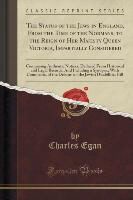Read more
Excerpt from The Status of the Jews in England, From the Time of the Normans, to the Reign of Her Majesty Queen Victoria, Impartially Considered: Comprising Authentic Notices, Deduced From Historical and Legal Records; And Including a Synopsis, With Comments, of the Debates on the Jewish Disabilities Bill
In a modern publication, The Laws and Ancient Institutions Of England, alaw is cited, relative to Jews in Edward the Confessor's time, which seems to support Spelman and Coke's Opinion. Johnson, however, classes this ordinance amongst the supposed laws of Edward. (see Collect. Of Eccles. Laws and Canons, vol. I, MLXIV.)
About the Publisher
Forgotten Books publishes hundreds of thousands of rare and classic books. Find more at www.forgottenbooks.com
This book is a reproduction of an important historical work. Forgotten Books uses state-of-the-art technology to digitally reconstruct the work, preserving the original format whilst repairing imperfections present in the aged copy. In rare cases, an imperfection in the original, such as a blemish or missing page, may be replicated in our edition. We do, however, repair the vast majority of imperfections successfully; any imperfections that remain are intentionally left to preserve the state of such historical works.
About the author
Charles Egan was born in Nottingham, England, of Irish parents. When he was five, the family returned to Ireland, as his father had been appointed Resident Medical Superintendent of St. Luke's, a psychiatric hospital in Clonmel, in County Tipperary. Every summer they visited his father's family's farm, outside Kiltimagh in County Mayo for a month, where his grandmother and uncles spent many evenings, talking about family and local history.
The family subsequently moved to County Wicklow, where he initially attended the De La Salle Brothers School in Wicklow town. He then went to the Jesuits' Clongowes Wood College (James Joyce's alma mater), and subsequently studied Commerce in University College Dublin, graduating
in 1973.
After an initial career in the private sector, including Marubeni Dublin, (where he met his future wife, Carmel), he joined the Industrial Development Authority (IDA) in Dublin. After a few years, the desire to be his own boss, led him to resign and set up his own business, which ran for 30 years.
Apart from business, his main interests are history, film and worldwide travel.

